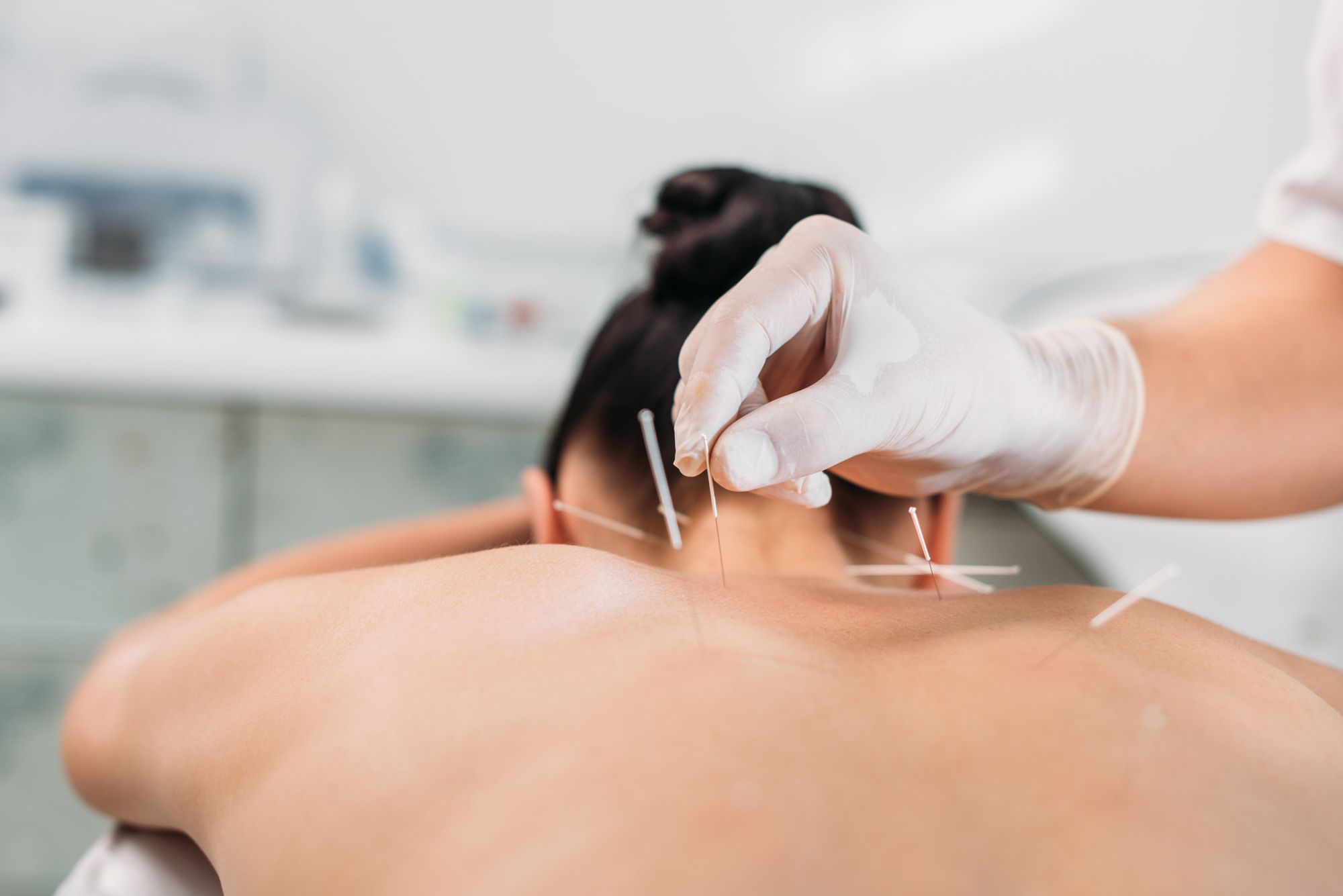
Acupuncture is a form of alternative medicine, and there are many different health benefits of acupuncture. This unique healing practice is one of the pillars of Traditional Chinese Medicine. The practice of acupuncture was devised before 2500 BCE in China, and gained popularity globally in the late 20th century, due to the many health benefits of acupuncture sessions.
You may be familiar with acupuncture, as it’s an alternative therapy that’s commonly seen on TV shows or in movies, easily recognized by the use of needles. Some people may feel squeamish about acupuncture because the human body becomes a pincushion – but the tiny needles aren’t that scary.
This Chinese medicine technique has many followers today, because it helps relieve aches and pains, could prevent certain diseases, and could improve one’s overall health and wellness. Learn more about the benefits of acupuncture below, along with an overview of what acupuncture is.
How Does Acupuncture Work?
This ancient practice is an outcome of the ancient Chinese philosophy of dualistic cosmic theory, also known as Yin and Yang. The Yin acts as the passive and dark principle, and the Yang works as the active and light principle. Ancient practitioners believed that the Yin represented the earth and the Yang represented the heavens, and that these two forces exist in the human body as well as throughout the natural universe.
Thus, any sickness in the body was viewed as being caused by an imbalance between the Yin and Yang, which disrupted the qi, or the body’s life force. The qi is a force that flows through the 12 pathways in the body, with each turn being associated with a corresponding major visceral organ, such as the liver, kidney, heart, etc.
The goal of acupuncture is to restore the flow of qi by fixing the balance between Yin and Yang and bringing harmony to the body. Therefore, restoring the flow of qi is one of the known benefits of acupuncture.
Acupuncture is carried out by the acupuncturist inserting small, metal needles into your skin and the underlying tissue at very specific pressure points. Each of these different pressure points can relieve different pain points, and targets the healing of different areas of the body. The needles are said to unblock the meridians or pathways to improve qi flow and restore optimal health.
Health Benefits of Acupuncture
Many who practice and receive acupuncture therapy do so for a myriad of reasons, as there are multiple health benefits of acupuncture. The needles are very tiny, so you barely feel them go through the epidermis. And even if you do feel a smidge of pain, it’s described as feeling like an ant bite. Sometimes, when the acupuncture needle hits a pressure point, it’s described as a ‘delicious pain’ that is enjoyable. Hence, the discomfort of dealing with needles becomes inconsequential, because of the many health benefits of acupuncture one can receive.
Below are some examples of the health benefits of acupuncture:

1. Headache Relief
Acupuncture has long been used to treat headaches. Studies indicate that acupuncture has been shown to lessen susceptibility to and frequency of migraines. An acupuncture session even provides a sense of relaxation, while being drug-free and minimally invasive. Notably, acupuncture for headaches is an elective treatment, a natural remedy, and could be a great option if you would like to avoid popping pain killers.
Choosing acupuncture instead of prescription painkillers could be a wise choice. Prescription painkillers come with a long list of negative side effects, including potentially harming your kidney and liver in the long run.
2. Reduced Neck Tension, Relief of Back Pain and Joint Pain
Today, many mundane tasks leave humans with all sorts of pain. Carrying your heavy work bag can create tension in your neck and pain in your back. Additionally, working day in and day out on a laptop keyboard or even texting can cause neck pain, joint pains in your knuckles, and other joints in your hands and arms. These kinds of pain can be extremely uncomfortable, and at times, debilitating. Acupuncture could provide drug-free pain relief to these kinds of pains, while also treating the inflammation and swelling in these areas. If you are worried about the needles, know that these are hair-thin and flexible, so you barely feel them when inserted.
3. Reduced Stress from Acupuncture Sessions
The daily hustle and grind can be incredibly draining and stressful. Sometimes, managing work and home demands can get to be too much. Unfortunately, excessive stress can result in a multitude of health issues and manifest itself in physical symptoms like high blood pressure or neck pain. For this reason, stress must be addressed before it gets out of hand. If you have trouble relaxing, research shows acupuncture could potentially relieve and reduce stress by lowering your stress hormone.
4. Improved Immune System
Acupuncture is believed to improve your immune system by fighting off pathogens. Additionally, it could relieve symptoms of colds, and reduce the number of days that you stay sick. Clinical studies illustrate that acupuncture is also beneficial for rhinitis patients, or patients who suffer from allergies and asthma, as the treatment can relieve these symptoms.
5. Increased Energy and Improved Mental Clarity
Acupuncture is said to be great for improving qi or energy flow. When meridians are unblocked by the acupuncture needles, the one receiving the acupuncture treatments could feel bursts of increased energy and improved mental clarity. It’s not uncommon to report feeling more productive and energetic after getting acupuncture. This is one of the lesser known benefits of acupuncture, but also one of the most significant.

6. Acupuncture Promotes Better Sleep
Studies show that those who receive acupuncture could improve sleep patterns as the unblocking of meridians result in energy flow and better blood circulation. The hormones responsible for sleep could function optimally, resulting in better sleep. Acupuncture has been shown to help patients suffering from chronic sleep disorders, like insomnia. It was also shown to have a better effect on sleeping patterns than sleeping pills.
7. Acupuncture Can Provide Relief From Digestive Health Issues
Digestion and gut health are linked to your overall health. A bad gut results in not only gut issues, but hormonal ones as well, and may cause other pains. Acupuncture could help regulate the digestive system, and is beneficial for those facing gastrointestinal diseases, such as ulcers, bloating, and acid reflux.
8. Reduces Symptoms of Neurological Disorders
Acupuncture is also currently being used as an alternative medicine to treat neurological disorders, such as Parkinson’s disease and Alzheimer’s disease. Results of clinical trials indicate that acupuncture could lessen the symptoms of these neurological diseases, helping improve language and motor skill function in the patients.
9. Helps Control Blood Pressure
With higher stress jobs and an increase in obesity levels, high blood pressure is now more common in adults than ever. Acupuncture, alongside other medical treatments, like maintenance medication, could help to reduce high blood pressure. This is because acupuncture supports better heart function and improved blood flow and circulation; thereby alleviating pressure in the veins and arteries.
But bear in mind that acupuncture can only be used as a complementary treatment for western medicine when it comes to heart health. Those who have been prescribed medication must follow their cardiologist’s advice for optimal wellness.
10. Promotes Recovery From Injuries
Acupuncture is a great tool for improving recovery from injury or post-surgical recovery. When used alongside other therapies and medication, it could speed up one’s recovery period and promotes faster rehabilitation. The wellness and immune support that acupuncture provides stimulate the body’s natural healing abilities.

Is Acupuncture Right For You?
You may benefit from receiving acupuncture, provided that you seek advice from both your doctor, and from a licensed acupuncture practitioner. If you’re not afraid of small needles, and you prefer natural remedies, acupuncture could help prevent and alleviate certain maladies. The cost of acupuncture will depend on where you live, but the general range is between 75 USD to 100 USD per session. Treatment sessions vary in length, and typically last 10 minutes to 30 minutes, giving you enough time to unblock your energy channels and let your qi flow.
Though acupuncture is a form of alternative medicine, it’s something that you should leave to those well-trained in the area. Unlike herbal remedies and other alternative solutions such as Tuina Massage, acupuncture involves needles. Despite these needles being thin and flexible, a mistake in their application may cause you more harm than good, especially if you end up hitting important nerves. Remember that acupuncture needles touch both the skin and underlying tissues.
This is why it’s crucial to see a licensed and experienced acupuncture practitioner.
You could also take a CircleDNA test to help you assess if acupuncture is suitable for you. CircleDNA reveals hundreds of DNA insights about yourself. For example, if you have a genetic blood disorder, acupuncture could be a poor fit for your constitution. Most people will find that acupuncture works for them, and if you try it, you might be surprised to discover all of the health benefits of acupuncture.






